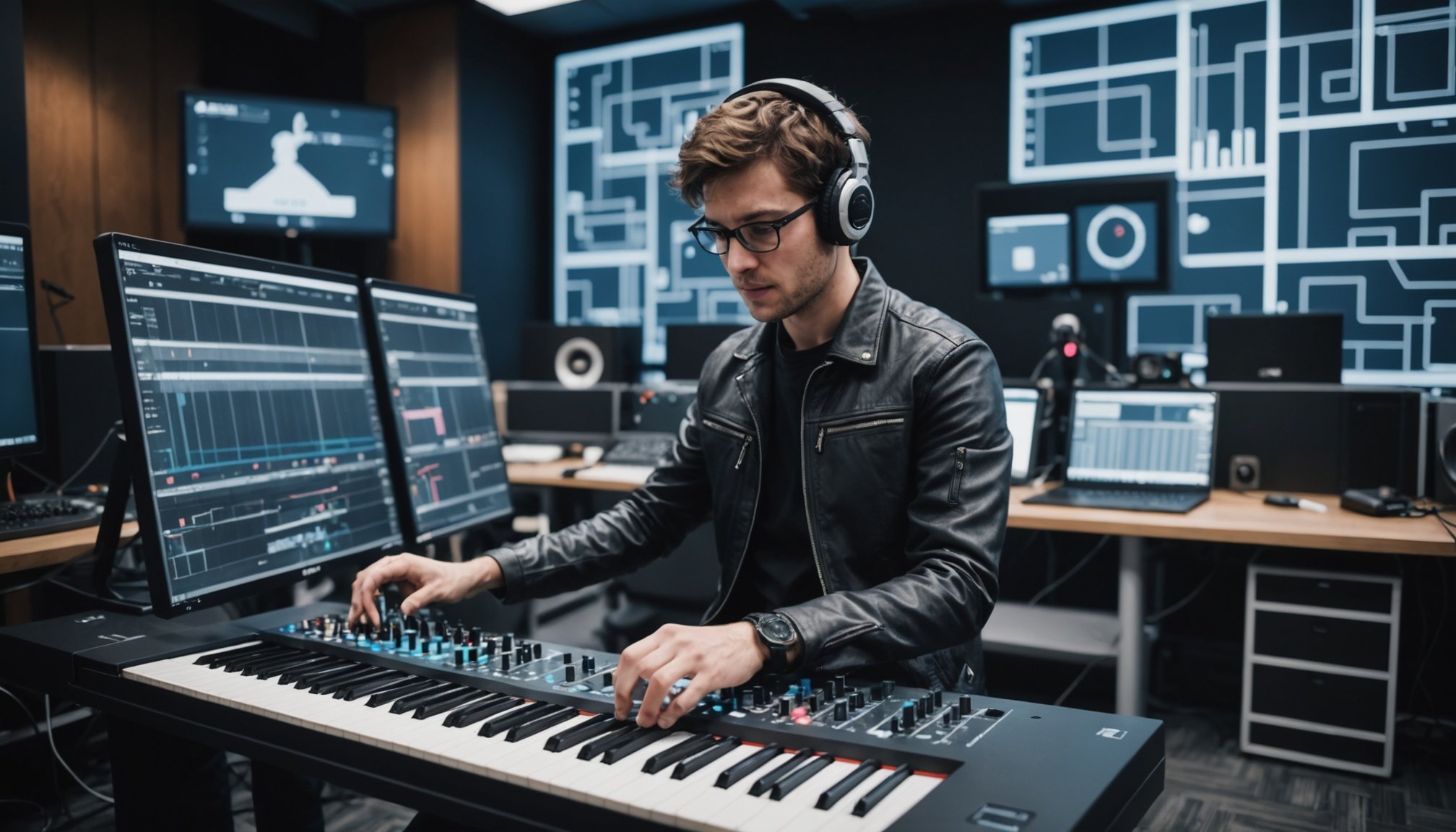Understanding AI in Music Composition
Artificial Intelligence (AI) has revolutionised how music is composed by introducing automated and innovative techniques. AI music generation leverages advanced tools to create melodies and harmonies, enhancing the traditional methods of music composition. AI can synthesize vast musical databases, emulating the styles of various composers, enabling artists to experiment with new soundscapes.
Enhancing Creativity and Variability
With AI, creativity and variability in music scores have reached new heights. Advanced AI music generation techniques allow for the creation of intricate compositions with rich textures and layers. This innovation is particularly beneficial in niche areas such as ambient music or soundtracks for interactive media, where diversity and adaptiveness are crucial.
Also read : Transforming Game Economies: Leveraging AI for Innovative In-Game Financial Systems
Adapting AI in Gaming Environments
The adaptability of AI in such dynamic contexts is a game-changer. In artificial intelligence in gaming, AI’s capability to respond and create in real-time ensures that music aligns seamlessly with gameplay. This adaptability enriches user experience by making each game session unique, adjusting musical elements to match the player’s actions or the game’s narrative flow.
Overall, the advancements in AI music generation continue to redefine how music is created and experienced across various applications, offering endless possibilities for creative exploration.
Also to see : Overcoming Challenges to Realistic Water Physics in Fishing Simulation Games
AI Techniques for Dynamic Music Generation
The integration of generative music algorithms has ushered in a new era for music composition. These algorithms operate by using predefined rules or data sets to compose original pieces, allowing for an impressive range of diversity and innovation in AI score creation. This technique is particularly effective in producing dynamic and unpredictable musical elements, ensuring each composition is unique.
Algorithmic Composition
Algorithmic methods are crucial for crafting music that feels both novel and coherent. Through the use of sophisticated algorithms, the system can produce music that mimics a composer’s distinct style, yet innovates within those boundaries. Generative algorithms are used to explore possibilities beyond manual composition, providing a base for limitless creative expression.
Machine Learning Approaches
Machine learning for music relies on vast data sets to educate AI systems about patterns and preferences in music. By analysing these patterns, machine learning can tailor compositions that adapt to varying contexts, offering a personalised musical experience. This adaptability makes it an invaluable tool in applications like gaming, where adaptive soundtracks enrich gameplay.
Deep Learning in Music
Deep learning enhances the ability to generate complex music patterns by mimicking neural processes akin to human creativity. This approach enables AI to understand and compose intricate musical structures, facilitating more nuanced and sophisticated music generation that aligns with modern creative demands.
Case Studies: AI in Rhythm Games
Rhythm games have become a prime example of how AI can enhance gaming experiences through AI-generated music examples. Successful rhythm games, such as SoundVoltex and Beat Saber, have integrated AI technologies to create dynamic soundscapes that align seamlessly with gameplay. These AI-generated soundtracks provide a unique gaming experience by adapting music to the player’s actions, creating a sense of immersion and engagement.
The use of AI soundtracks in such games offers immense value. It allows for an evolving auditory environment that can change in response to how the game is played. This feature keeps the experience fresh and unpredictable, encouraging repeated engagement. AI’s role goes beyond just generating music; it optimises it to ensure it fits the narrative and pace of the game.
Additionally, analysis of user engagement highlights how dynamic soundscapes made possible by AI can significantly enhance player satisfaction. As players navigate through these games, they encounter ever-changing musical patterns that motivate them to keep playing. This adaptability showcases AI’s potential in creating music that not only entertains but also builds a deeper connection between the player and the game itself.
Best Practices for Integrating Music and Gameplay
Achieving a seamless blend between music integration strategies and gameplay mechanics requires careful planning and execution. With the right approach, developers can significantly enhance gameplay enhancement, ensuring an immersive and captivating experience for players.
Maintaining Player Engagement
To maintain engagement, it’s essential to use dynamic score integration that adjusts in real-time based on player actions. This approach ensures that the music reflects the intensity and progression of the gameplay, creating a cohesive and immersive environment. By employing adaptive soundtracks, developers can provide a fresh experience with each session, as the music evolves with game events.
Syncing Music with Game Mechanics
Synchronization between music and game mechanics is crucial for a unified gaming experience. Techniques such as aligning musical cues with in-game events can heighten emotional responses and provide players with immediate feedback. For instance, increasing tempo during high-action sequences can amplify excitement, while softer music can accompany exploration or stealth moments.
Adaptive Soundtrack Design
Designing adaptive soundtracks involves creating music that responds dynamically to the player’s journey. By incorporating elements like branching musical paths or evolving themes, developers can craft an audio experience that resonates on a personal level. This strategy not only enriches the gameplay but also strengthens the emotional connection between the player and the game.
Tools and Resources for AI-Driven Music Creation
In the realm of music composition software, there exists an array of tools that harness AI for crafting innovative compositions. These tools blend technology with artistry, enabling both novices and seasoned musicians to expand their creative horizons. From generating fresh melodies to emulating complex harmonies, AI-powered software provides a dynamic platform for music creation.
For game developers, AI tools offer critical resources to integrate dynamic scores into gaming environments. Software like Wwise and FMOD are prominent examples, allowing developers to implement adaptive soundtracks that respond to gameplay in real-time. This adaptability not only enhances the gaming experience but also maintains player immersion through responsive audio elements.
Musicians also benefit from dedicated resources aimed at exploring AI technology. Platforms such as Amper Music and AIVA enable artists to experiment with AI-driven compositions. These resources offer insights into how artificial intelligence can augment traditional music-making, providing musicians with novel avenues for creative expression.
Key tools and resources empower both musicians and developers to engage with AI in uniquely personalised ways. As AI continues to evolve, its role within music composition becomes an exciting frontier, blending creativity with technological innovation.











